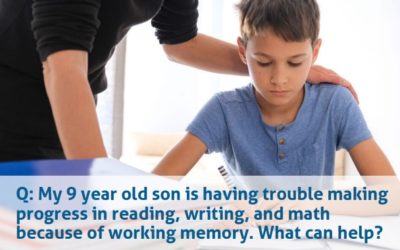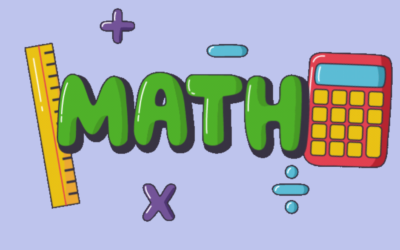It's important to be aware that although many dyslexics have natural strengths in math reasoning and scientific thinking, these strengths may not be evident during K-12 education because of challenges with symbol confusion and polysemous or multiple meaning words in...
What Can Help with Working Memory Limitations?
Q: My 9 year old son is having trouble making progress in reading, writing, and Math because of working memory. What can help? Working memory is a type of memory that allows us to temporarily hold information 'in mind' to be used for other cognitive tasks. Some people...
Teaching Geometry to Dyslexic Students [Premium]
“Henry Winkler… got his diploma in the mail only after taking the same geometry class eight times in a row over the course of four years, during the summers and regular school semesters, and finally passing with a D-.” — Alia Wong, “The MisEducation of the Fonz”, Atlantic Monthly It’s surprisingly hard to find research publications on teaching geometry to dyslexic students. One reason, suggested by Kay and Yeo in their book Dyslexia and Maths, is that numerical difficulties are more common among dyslexic students than geometric ones. They cite one study of 92 students followed over four years in which 50% failed to meet standards in Number Work, compared to 27% who missed for “Measure, Shape and Space.” That being said, because geometry is […]
Statistician with Dyscalculia – A Chat with Dylan Lynn [Premium]
How can a statistician have dyscalculia? Welcome to the wonderful world of mathematics – the field is as wide as it is deep. One of the keys to Dylan’s love of statistics, and later data analysis is that she loved math to tell stories. She loved the puzzle-solving aspect of statistics and how information could be made accessible through analysis to drive decision-making and policy. Although Dylan had indeed struggled with many lower level aspects of math – like timed math fact retrieval, math symbols, and fractions, she flourished as a data analyst in tech companies, drawing trends across disciplines and communicating what she learns from patterns that she recognizes to drive informed decisions. Such a career has many aspects of MIND […]
Teaching Math with Visual Models [Premium]
One way to teach to students’ strengths is to build on nonverbal reasoning and experimential – multisensory learning strengths in math. What does that mean? It means not being in a hurry to have students work through math problems before a strong foundational understanding and technical math meanings are established, and building on math reasoning before diving into math problem-solving involving symbols and technical language. Room to Discover has an excellent post on Visual Models. With five representations of mathematical ideas, why is there so much focus on verbal and symbolic work? The creator of Room to Discover also runs workshops and publishes manipulatives and other resources to his store. The Room to Discover site focuses on graphic representations – but a related […]
Building on Strengths in Math
Up to 70% of dyslexic people also have dyscalculia (specific math disability), although specific math supports or interventions are rarely a part of public school IEPs or 504's. Part of the reason there is less support for math among dyslexic students in the US is...
Math Problems: Does It Matter If It’s Identified As A Math Disability? [Premium]
There are millions of school children struggling with math at school. Does it matter if a student’s math struggles are identified formally as a math disability or dyscalculia? 40% of dyslexic people are likely to also have dyscalculia, but because dyscalculia is rarely assessed in schools, few individuals ever receive that designation. Does it matter? In the short term, some school professionals might say it does not matter much – because students who need help in math will get it if their scores qualify. What do we believe? Having a math LD formally identified can be helpful – although we realize that testing may not always be easily available. If you are a testing professional, consider adding the WIAT Math subtests to routine comprehensive battery […]
Math: Teaching with Physical Materials [Premium]
Almost half of all dyslexic student may have math disabilities (Wilcutt et al.2013), but math disabilities or dyscalculia are rarely recognized in public or private schools in the US. All the more important for tutors, teachers, and parents to be aware of dyslexia-related differences in learning better ways of helping information ‘stick’. One helpful example for how to support math for dyslexic students comes from the Sagonaska Demonstration School. They have completely embraced multisensory learning and have considered how reading and writing challenges can affect the way students learn and show their work. Third Space Learning has nice graphics about this approach. Briefly, it involves introducing new math concepts with physical materials, then switching to the use of drawings (representations) to work […]
Free Visual and Hands-On Math Curriculum: Bridges
Recently, I discovered a free visual and hands-on math curriculum from The Math Learning Center, a non-profit organization that grew out of a National Science Foundation project. The curriculum is for Pre-K through 5th grade and it may be helpful as an addition to...
Schools Missing the Boat on Dyslexia and Math [Premium]
Forty-four percent of dyslexic students also meet diagnostic criteria for math disability, according to researchers, but math rarely receives specific designations on students’ individualized education plans. What is the result? Dyslexic students with math disabilities underperform, fail, get held back, and find themselves excluded from certain academic tracks and majors (like science, technology, and engineering). What they really need though are informed teachers and school programs that understand their specific needs and teach them based on their strengths. CHALLENGES AND STRENGTHS IN MATH In a review of 50 consecutive dyslexic students seen in our clinic, the following patterns were seen in their WISCIV IQ and WIAT-III achievement scores. Our practice was unusual because we had many gifted referrals from the Silicon Valley and many students […]
Multiplication [Premium]
Multiplication has always been my nemesis. When I was testing a student and Brock heard me hesitate when a student was answering a math fact, he took that job away from me. I know I’ve spoken about the stories and mnemonics at Multiplication.com before, but if this approach is not a match for your student, consider multiplication chart or machine approaches which also use both visual and kinesthetic approaches to remember. One thing we had in our house was a Multiplication Machine like this one from Lakeshore Learning: It’s a low-tech gadget but surprisingly is attractive for kids practicing their times tables. It especially helps those who are kinesthetic learners – pressing on the number to get the answers reinforces the facts. For kids who […]
Memory Problems and Math [Premium]
Many students and adults attribute difficulties in math to memory problems, but probing these difficulties further often leads to the realization that it’s not a simple matter of remembering or forgetting, but rather trouble defining, organizing, then retrieving what has been learned. PROBLEMS DEFINING AND UNDERSTANDING ‘WHY’ First of all, if a student is struggling with remembering new information, it’s best to check and see if the definitions, procedures, and the why of procedures are clear. In fact, it may be a flipside of a strength in long-term memory that contributes to dyslexic students’ confusion with ambiguous terms. A good example of this James Tanton’s blog post: When fractions are introduced as pieces of pie, 3/5 + 1/5 makes sense to equal 4/5, but what […]

![Math and Sciences: Symbols and Dyslexia [Premium]](https://www.dyslexicadvantage.org/wp-content/uploads/2024/03/Math-and-Sciences-1-400x250.jpg)

![Teaching Geometry to Dyslexic Students [Premium]](https://www.dyslexicadvantage.org/wp-content/uploads/2024/02/Teaching-Geometry-to-Dyslexic-Students-400x250.jpg)
![Statistician with Dyscalculia – A Chat with Dylan Lynn [Premium]](https://www.dyslexicadvantage.org/wp-content/uploads/2024/01/Screen-Shot-2024-01-07-at-9.53.13-PM-400x250.png)
![Teaching Math with Visual Models [Premium]](https://www.dyslexicadvantage.org/wp-content/uploads/2023/12/Teaching-Math-with-Visual-Models-400x250.jpg)

![Math Problems: Does It Matter If It’s Identified As A Math Disability? [Premium]](https://www.dyslexicadvantage.org/wp-content/uploads/2023/07/MATH-PROBLEMS-DOES-IT-MATTER-IF-ITS-IDENTIFIED-AS-A-MATH-DISABILITY-D_A-400x250.png)
![Math: Teaching with Physical Materials [Premium]](https://www.dyslexicadvantage.org/wp-content/uploads/2023/05/Teaching-with-Physical-Materials-e1683788874447-400x250.jpg)

![Schools Missing the Boat on Dyslexia and Math [Premium]](https://www.dyslexicadvantage.org/wp-content/uploads/2023/03/SCHOOLS-MISSING-THE-BOAT-ON-DYSLEXIA-AND-MATH-400x250.png)
![Multiplication [Premium]](https://www.dyslexicadvantage.org/wp-content/uploads/2023/02/multiplication-envato-400x250.jpg)
![Memory Problems and Math [Premium]](https://www.dyslexicadvantage.org/wp-content/uploads/2023/02/Memory-Problems-and-Math-Premium-400x250.png)













